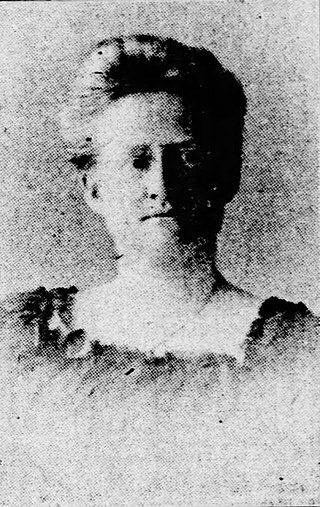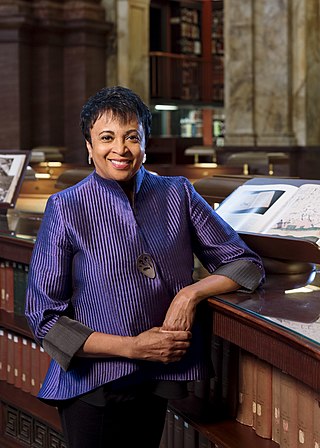
A librarian is a person who works professionally in a library providing access to information, and sometimes social or technical programming, or instruction on information literacy to users.

The Bibliotheca Alexandrina (BA) is a major library and cultural center on the shore of the Mediterranean Sea in Alexandria, Egypt. It is a commemoration of the Library of Alexandria, once one of the largest libraries worldwide, which was lost in antiquity. The idea of reviving the old library dates back to 1974 when a committee set up by Alexandria University selected a plot of land for its new library. Construction work began in 1995, and after some US$220 millions had been spent, the complex was officially inaugurated on 16 October 2002. In 2010, the library received a donation of 500,000 books from the Bibliothèque nationale de France (BnF). The gift makes the Bibliotheca Alexandrina the sixth-largest Francophone library in the world.

Mahdi Elmandjra was a Moroccan futurologist, economist and sociologist. He is one of the founders of the International Federation for Future Studies (Futuribles). He predicted a number of events, the most important of which was the clash of civilisations in his book "The first civilisation war" in 1992, that is, before Samuel Huntington, who used the same concept in his book "The clash of civilisations" issued in 1996. Mahdi Elmandjra also predicted the occurrence of the "Arab Spring", which he referred to in his writings under the name of "Intifada".

Ekmeleddin Mehmet İhsanoğlu is a Turkish academic, diplomat and politician who was Secretary-General of the Organisation of Islamic Cooperation (OIC) from 2004 to 2014. He is also an author and editor of academic journals and advocate of intercultural dialogue.

Farouk Hosny is an Egyptian abstract painter who was Minister of Culture from 1987 to 2011.

Jesse Hauk Shera was an American librarian and information scientist who pioneered the use of information technology in libraries and played a role in the expansion of its use in other areas throughout the 1950s, 60s, and 70s.

Ismail Serageldin, Founding Director of the Bibliotheca Alexandrina (BA), the new Library of Alexandria, inaugurated in 2002, is currently, Emeritus Librarian, and member of the Board of Trustees of the Library of Alexandria. He serves as Chair or Member of a number of advisory committees for academic, research, scientific and international institutions and civil society efforts, and serves on the Advisory Committee of the World Social Science Report for 2013 and 2016, as well as the UNESCO-supported World Water Scenarios (2013) and the executive council of the Encyclopedia of Life (2010) and Chairs the Executive Council of the World Digital Library (2010). He also co-chaired the African Union's high level panel for Biotechnology (2006) and again for Science, Technology and Innovation (STI) in 2012–2013, and was a member of the ICANN Panel for the review of the internet future (2013).
Mohamed Safwat El Sherif was an Egyptian politician who served as chairman of the State Information Service, minister of information, speaker of the Egyptian Shura Council, and secretary general of the ruling National Democratic Party, and head of the Supreme Press Council.

Robert Sidney Martin, Ph.D. is an American librarian, archivist, administrator, and educator. He is Professor Emeritus, School of Library and Information Studies, Texas Woman’s University, where he was the Lillian M. Bradshaw Endowed Chair until his retirement in 2008.

Amr Elleithy, 2010 UNESCO laureate, is an Egyptian television and radio celebrity. Graduated from the Faculty of Law at Cairo University, he was also attached to the Higher Institute of Arts, where he attained his bachelor's degree at the Direction Section. He later pursued his studies in the field of media, to attain his Master of Science degree in "Interactive media Science" University of Adams Smith, USA. in 2001.He was awarded his PHD degree, with distinction, from the Higher Institute of Criticism, in conjunction with the Faculty of Media, Cairo University, 2012.
Peggy Sullivan was an American librarian and educator. She was elected president of the American Library Association and was a scholar of the history of librarianship.

Library science is an interdisciplinary or multidisciplinary field that applies the practices, perspectives, and tools of management, information technology, education, and other areas to libraries; the collection, organization, preservation, and dissemination of information resources; and the political economy of information. Martin Schrettinger, a Bavarian librarian, coined the discipline within his work (1808–1828) Versuch eines vollständigen Lehrbuchs der Bibliothek-Wissenschaft oder Anleitung zur vollkommenen Geschäftsführung eines Bibliothekars. Rather than classifying information based on nature-oriented elements, as was previously done in his Bavarian library, Schrettinger organized books in alphabetical order. The first American school for library science was founded by Melvil Dewey at Columbia University in 1887.

Sarah Comly Norris Bogle was an American librarian most noted for her influence in establishing education for librarianship. Her achievements lay in creating a system which enabled the American Library Association to accredit existing library school programs. She is considered one of the most influential librarians in the field of library science due to her efforts in implementing a universal curriculum in order to teach students the fundamentals of library science.
William Shepherd Dix was a scholar and librarian who had a 22-year career as Librarian at Princeton University in New Jersey, without a degree in library science. His contributions to the field of librarianship, however, are varied and notable, making him worthy of recognition in the American Libraries' 100 most important figures.
Leon Carnovsky was a librarian and educator who focused much of his time to the survey of libraries in the United States and around the globe. Carnovsky was recognized by American Libraries as being one of the 100 most influential figures in Library and Information Sciences.

Carleton Bruns Joeckel, was an American librarian, advocate, scholar, decorated soldier and wrote the National Plan for Public Library Service (1948) that provided the foundation for nationwide public library services.

The University of Chicago Graduate Library School (GLS) was established in 1928 to develop a program for the graduate education of librarians with a focus on research. Housed for a time in the Joseph Regenstein Library, the GLS closed in 1989. GLS faculty were among the most prominent researchers in librarianship in the twentieth century. Alumni of the school have made a great impact on the profession including Hugh Atkinson, Susan Grey Akers, Bernard Berelson, Michèle Cloonan, El Sayed Mahmoud El Sheniti, Eliza Atkins Gleason, Frances E. Henne, Virginia Lacy Jones, Judith Krug, Miriam Matthews, Kathleen de la Peña McCook, Elizabeth Homer Morton, Benjamin E. Powell, W. Boyd Rayward, Charlemae Hill Rollins, Katherine Schipper, Ralph R. Shaw, Spencer Shaw, Peggy Sullivan, Maurice Tauber and Tsuen-hsuin Tsien.
Lionel Roy McColvin (1896–1976), commonly referred to as Lionel McColvin, was a British librarian. He has been described as "the dominant figure in British public librarianship" in the mid-20th century and a "world leader" in the profession of librarianship. Through his membership of the Library Association and several international library committees he worked constantly to improve the "status of librarianship" and its "standards of service".
El Sayed Yassin was an Egyptian political and social writer and intellectual. He was born in Alexandria on 30 October 1931.
Badredin Mahmoud Aboughazi was the Egyptian Minister of Culture from November 1970 to May 1971. He supervised the issuance of the Comprehensive Social Survey of the Society (1952–1980), this was called the "Second Description of Egypt", and that was the last important work that was done by him.












